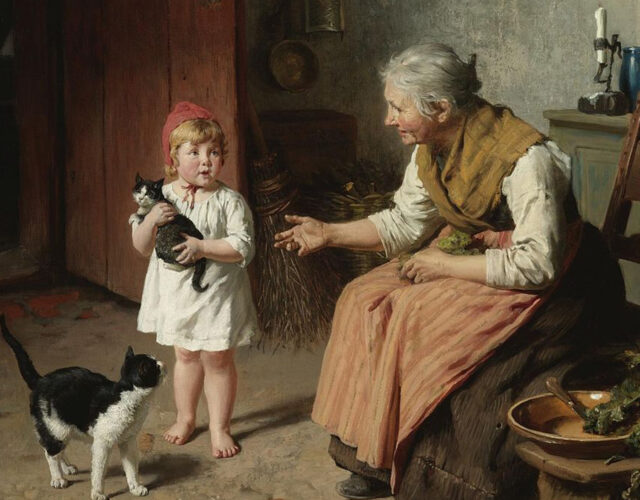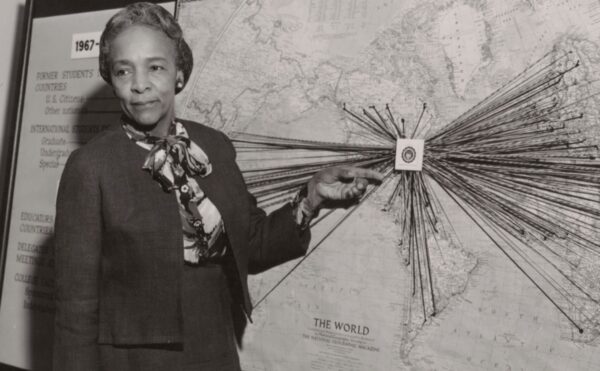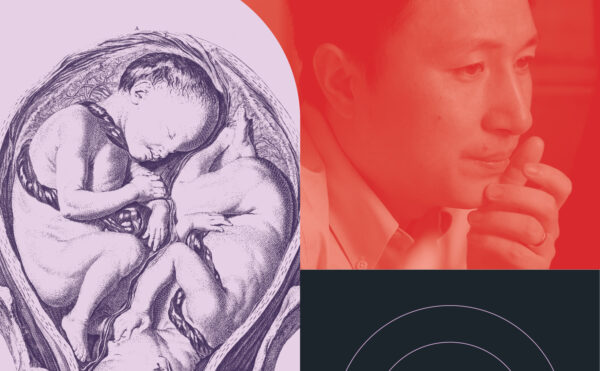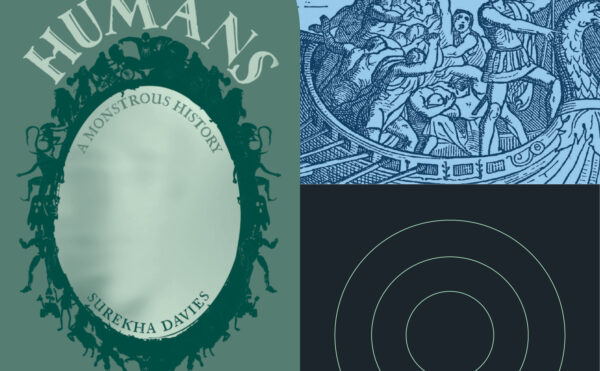Baby horses and giraffes walk soon after they’re born, and they can feed and take care of themselves pretty quickly, too. A one-year-old person, on the other hand, is basically helpless. But humans go on to live much longer than most other mammals, and scientists have long been trying to piece together why this is the case.
One theory called the grandmother hypothesis, claims that grandmas are the key to why humans live so long. Unlike most other species, human females live long past their childbearing years and so can help raise their grandchildren, allowing their daughters (or daughters-in-law) to have another baby before the first one can take care of itself.
As warm and fuzzy as this idea sounds, it turns out to be pretty controversial. In this episode of Distillations, we explore the grandmother hypothesis and find out what the debate is all about.
Credits
Producer: Mariel Carr
Associate Producer: Rigoberto Hernandez
Our theme music was composed by Zach Young
Transcript
Grandmothers Matter: Some surprisingly controversial theories of human longevity
Introduction
Moses Carr >> Sound of rolling tongue
Wanda Carey >> laughs
Mariel: Welcome to Distillations, I’m Mariel Carr.
Rigo: And I’m Rigo Hernandez.
Mariel: And we’re your producers! We’re usually on the other side of the microphones.
Rigo: But this episode got personal for us.
Wanda >> Baby, baby, baby…
Mariel: That’s my mother-in-law Wanda and my one-year-old son Moses. Wanda moved to Philadelphia from North Carolina for ten months this past year so she could take care of Moses while my husband and I were at work.
Rigo: And my mom has been taking care of my niece and nephew in San Diego for 14 years. She lives with my sister and her kids.
Mariel: We’ve heard of a lot of arrangements like the ones our families have: grandma retires and takes care of the grandkids.
Rigo: And it turns out that across cultures and throughout the world scenes like these are taking place.
Mariel: And it’s not a recent phenomenon either. It goes back a really long time. In fact, grandmothers might be the key to human evolution!
Rigo: Meaning they’re the ones that gave us our long lifespans, and made us the unique creatures that we are.
Wanda >> I’m gonna get you! That’s right!
Mariel: A one-year-old human is basically helpless. We’re special like that. Moses can’t feed or dress himself and he’s only just starting to walk. Gravity has just become a thing for him.
Rigo: And my niece and nephew are older, but they’re still too young to fully take care of themselves.
Mariel: Baby giraffes and horses—on the other hand—they can walk soon after they’re born. And they learn to feed themselves pretty quickly too.
Rigo: Here’s another way humans are special: almost every other female mammal reproduces until she dies. So non-human grandmas are busy taking care of their own offspring—until they die.
Mariel: Human are different. If we’re lucky, we’ve got helpful, available grandmothers. But the key to them being helpful is that they don’t have their own babies.
I)Bedlam: Misunderstanding Menopause
Angela Saini >> It’s always been a big riddle for scientists to kind of get to the heart of why it is that women live so long, and often very many healthy years, into infertility.
Rigo: That’s British science journalist Angela Saini.
Saini >> No other primates do that.
Mariel: Men are able to reproduce into old age. But women—who live longer than men on average—often live decades past their childbearing years. So the riddle is this: if natural selection favors reproductive success— having as many babies as possible—then why would anyone outlive their ability to reproduce? What would be the point?
Rigo: Scientists have been trying to make sense of this evolutionary paradox for a long time. And they’ve come up with a variety of theories.
Mariel: Some are pretty heartwarming.
Rigo: Others might make you cringe. For a long time menopause wasn’t just misunderstood, it was vilified.
Saini >> Bedlam is probably one of the most famous mental institutions in the world.
Rigo: That’s Angela Saini again. She recently published a book called Inferior: How Science got Women Wrong and the New Research That’s Rewriting the Story.
Saini >> For us today, the word is synonymous with kind of craziness and chaos.
Rigo: Bethlem Royal Hospital or Bedlam as it is known, is in London and it’s Europe’s oldest psychiatric hospital. It now has a museum chronicling its history. Angela visited and was struck by two photographs from the Victorian Era.
Saini >> One shows a woman kind of holding a doll, almost like a baby. The other image I think is just of an older woman with a kind of far away look in her eyes, this kind of dreamy, far away look. In all likelihood, these two women were menopausal, and they kind of sum up how, in that time, how menopausal women were thought of. They were really though of kind of old crones at the end of their life. They were no longer able to fulfill this vital societal function of having children. If you live in a society or culture in which having babies is your primary function, and suddenly you can’t do that any more, that also has deep psychological impact.
Rigo: But then people started to wonder if there was an evolutionary reason for menopause.
Saini >> Many years ago, somebody came up with the idea that possibly it’s so that they can be around to help their children and their grandchildren.
Mariel: It certainly made sense to us. This is me and Wanda:
Carr >> Was it hard? Were you tired?
Wanda >> Absolutely! Yes. Yeah, it was hard and I was tired, but it was so much fun. I’m in my sixties! And I believe very strongly there’s a reason people are no longer fertile in their sixties and that’s because you get tired!
Rigo: And this is me and my sister, Rosalba.
Rosalba >> Having my mom around to take care of Lesly was an invaluable resource. If I didn’t have that I would have had to find someone else to take care of her. And there was no one better to take care of her than her grandma. Do you know what I mean? If I had left her with someone else I wouldn’t know how she’d be treated because they’d be a stranger. And for my mom it was her granddaughter.
Rigo: Our mom took care of my niece Lesly starting when she was one month old. Now she’s
14. To this day my niece calls my mom, “Mama Carmen.”
Saini >> We know statistically that grandmothers have a really profound effect on childhood survival.
Mariel: The idea is that it’s not enough to get your genes into the next generation. It’s evolutionary beneficiary to make sure those genes grow up. Biologist William Hamilton planted the seeds of this grandmother hypothesis in 1966. But it wasn’t until the 1980s that it really took off.
Saini >> The person who’s done the most work on kind of putting the meat on the bones of the idea was Kristin Hawkes at the University of Utah.
II)Kristen Hawkes and Grandmother Hypothesis
Kristen Hawkes >> I’m always happy to talk about grandmothers.
Mariel: Kristen Hawkes is an anthropologist who’s studied the Ache and Hadza tribes in Paraguay and Tanzania.
Hawkes >> The textbook story about human evolution is mostly still the hunting hypothesis. And I am putting scare quotes around that here which you can’t see.
Mariel: This theory says that at some point in our history men began hunting large and fast animals and women paired off with them so they’d be taken care of. And a whole bunch of things followed from this: nuclear families, tools, language …
Hawkes >> I thought, yeah, you know, of course, that must be it.
Mariel: But then she started looking at the Hadza in Tanzania and that’s not what she saw.
Hawkes >> Yeah, men were hunting, women were gathering, men were spending an enormous amount of time going especially for mammals and they were not especially bringing home the bacon to their wives and kids.
Mariel: So we have to back up for a second here. Hawkes and her team were studying modern hunter-gatherers to try to piece together what happened in our very distant past. Anthropologists look at hunter-gatherers like the Hadza because they live like early humans did, before agriculture. And their environment in East Africa is similar to the one in which our ancestors evolved. So there they were watching the Hadza, which happen to be a tribe studied by a lot of anthropologists, and they saw that the men hunted for big prize animals.
Hawkes >> When they got one, it was just a huge pile of meat.
Mariel: But they found that the hunters only had a five percent success rate on any given day.
Hawkes >> They went out there specializing in this activity that was going to give them a huge bonanza if they were successful and they were going to essentially always fail.
Well that’s a hell of a way to feed the kids.
Mariel: But the tribe wasn’t starving either. They made up the difference by foraging. So Kristen and her team began observing who foraged and how much.
Hawkes >> And just coming out of the data was this astonishing result that the old ladies, holy moly! Were so economically productive.
Mariel: They realized that when Hadza mothers had new babies they couldn’t keep helping their young children forage. But those kids weren’t old enough to do it on their either. So grandmas stepped in to help.
Hawkes >> So there was right before our eyes. We were seeing this trade-off. Moms move on, have that next baby because the previous one, even though it couldn’t yet feed itself, it was subsidized by grandmother. You don’t devote all your attention and effort to one at a time and then have the next one only when that one can manage on its own, we stack them up, because we can. And it’s fitness enhancing if you can do that.
Mariel: So Kristen’s team theorized that natural selection favored helpful grandmas, who could only be helpful if they didn’t have children of their own. From here we get menopause and long lives. It’s pretty nice, right? But as warm and fuzzy as it is, it turns out to be pretty controversial.
III)Opposing Theories/Controversy
Hawkes >> Yeah, the grandmother hypothesis is often framed as ignoring males and somehow privileging female life history over male life history.
Rigo: Harvard Anthropologist Frank Marlowe also studied the Hadza tribe many years after Kristen Hawkes. Even though he was immersed in the same community he came up with a
dramatically different conclusion in 1999. His theory gives men a leading role in our evolution. It’s called the Patriarch Hypothesis.
Saini >> And this says the reason women experience menopause is because no men of any age find older women attractive.
Hawkes >> And his argument was that because men remain fertile to older ages and so older men may have lots of offspring that that’s actually what drove the shift in our life history to make longevity advantageous.
Mariel: All of these life history theories, as they’re called, use mathematical models to back up their hunches. Kristen Hawkes’ team ran a computer simulation that showed how slowly increasing the number of long lived grandmothers in a population made everyone live longer.
Frank Marlowe’s simulation was different.
Hawkes >> They had built a model in which if males preferred younger females, and if females had to compete for every maternity, then their formal models showed that what begin to happen was fertility in females was shortened. I think that’s the way their story goes.
Rigo: The theory adds that because the genes that cause longevity are not on the Y chromosome they get passed on to both men and women. Women get dragged along. But their eggs run out before they do, so the result is menopause. There are scientists and anthropologists in both camps, and new research continues to build on both theories. Rama Singh is an evolutionary biologist at McMaster University in Ontario, Canada. He co-authored a study in 2013 called Mate Choice and the Origin of Menopause. It’s not such a surprise that there was some pushback.
Rama Singh >> We showed that this simple idea, mate choice, male choice for younger women, would have the biological consequence of depriving older women from reproduction and making them infertile. This is a straightforward, population genetics theory, which is common sense really.
Hawkes >> The headlines for their paper was “Putting the men back in menopause.”
Singh: Some women did not like our theory. Those feminist women in general did not react well. They thought that we are showing that in the past men have exercise and women have had no role. That’s not true. Our theory doesn’t say that women have had no role. But you cannot wipe out biology, or biological differences simply because modern society hinders with our concept of equality.
Rigo: Another new study, published in October 2017, claims that none of these theories have anything to do with human longevity. The paper by Jacob Moorad at the Edinburg School of Biology, analyzed birth records of mostly Mormon settlers in Utah. And he found no genetic evidence to prove the grandmother hypothesis or its competitors. The paper basically puts us back where we started. And no doubt this paper will be disputed and debated. Maybe finding out which theory is correct is beside the point.
IV)Gender Bias
Saini >> It’s been interesting for me and especially as a woman, to read these different ideas. I think what was even more fascinating for me, as a journalist, was to see the controversy.
Mariel: While she was researching her book, Inferior, Angela Saini found that mostly women have worked on the grandmother hypothesis, whereas—
Saini >> The patriarch hypothesis, as far as I can tell, pretty much only men have worked on. It’s always interesting when science cuts along gender lines. Why is it that one group of people follow this theory, and another group of people follow this theory? I’m sure that their sex has a role to play in what they choose to research because that’s the case in all of science. We pick topics that are of interest to us.
Rigo: Alyssa Crittenden is an anthropologist at The University of Nevada. She was Frank Marlowe’s graduate student in the early 2000s and she went with him to study the Hadza in Tanzania. And she’s been going back ever since. When we asked what she thought of his theory she said—
Crittenden >> We parted ways on the patriarch hypothesis—
Rigo: But when she described their work with the Hadza things got interesting.
Crittenden >> Frank spent the majority of his time foraging with men and I spent almost all of my time over the last 13 years with women and children and infants. So at the very basic level I have spent the majority of my time with the Hadza with women and children, and Frank spent the majority of his time with men and teenage boys.
Mariel: Alyssa told us all life history theorists pick one driver for human evolution and then stick with it. Kristen Hawkes picked grandmothers, Frank Marlowe picked old men. But it must be hard to have your theory star someone you aren’t even paying attention to.
Saini >> Women have often been overlooked by men historically. In the 20th century, when hunter-gatherer societies were studied, or even when primates were studied, people focused on the males because they just assumed they would have the more interesting behavior that they were leading evolution development somehow. And women bothered to look at women.
Mariel: But Alyssa says it’s complicated. Even if Frank Marlowe had wanted to study Hadza women, they wouldn’t have let him.
Crittenden >> So as a female scientist there are certain aspects of Hadza male life that I am not welcome to study and vice versa. So, for instance, I have seen several Hadza births and Frank was never invited to attend a birth.
Rigo: Both the research and the criticism of these theories can cut along gender lines. Donna Holmes is an exception. She’s an evolutionary biologist at the University of Idaho and she does not agree with the grandmother hypothesis. This has caused some tension.
Donna Holmes >> There was a period of time in the ’90s when, when I’d be at meetings with other evolutionary biologists, men that I knew that had argued about the grandmother hypothesis would talk about how many nasty emails they got from feminists, and they’d say, “You know, I’m just dropping this subject. It’s just too loaded. I don’t need to get flamed.” You don’t want to be a bad feminist. You don’t want to be anti- Hawkes. You don’t want to be anti-grandma…
Rigo: Donna doesn’t believe in the grandmother hypothesis because she says evidence is anecdotal and lacks in qualitative data. She also says that the field of anthropology in general has flaws.
Holmes >> It doesn’t use a comparative approach. It doesn’t use a physiological approach. It doesn’t use a quantitative genetic approach. It’s just not the same set of intellectual customs that are followed in anthropology.
Rigo: Donna says she understands that anthropologists might be overcorrecting for a lifetime of research that has ignored women.
Holmes >> Who doesn’t like the idea that grandmas are special and that they contribute? And they do! I mean we do. When we can, we do. But it doesn’t mean that we do that because it’s an outcome of natural selection.
Mariel: So are grandmothers the drivers of human evolution? It’s still unclear. And the answer will depend on who you ask—maybe because of their gender, but maybe because of what kind of scientist they are. But one thing no one is debating is how important grandmothers are.
Moses Carr >> rolling tongue
Wanda Carey >> Okay! Yes! Precious one. You precious one.
Carmen Rigo >> Hoy quiero vivir, un dia la vez, un dia la vez.
Mariel: Distillations is more than a podcast. We are also a multimedia magazine. You can find our videos, our blog and our print stories at Distillations.org. You can also follow Chemheritage on Twitter, Facebook, and Instagram. This episode of Distillations was produced by myself and Rigo Hernandez. And original music was composed by Zach Young.
Mariel: For Distillations, I am Mariel Carr.
Rigo: And I am Rigo Hernandez.




